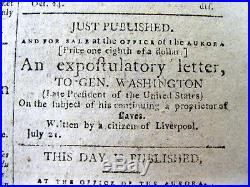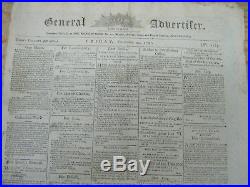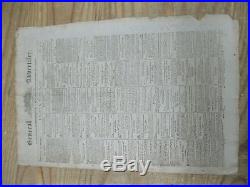1797 newspaper w ad for a book critical of GEORGE WASHINGTON for OWNING SLAVES




1797 newspaper with an ad for a book critical of GEORGE WASHINGTON for OWNING SLAVES. This was printed and distributed while GEORGE WASHINGTON was still living - inv # 6Q-136. SEE PHOTO----- COMPLETE, ORIGINAL NEWSPAPER, the Philadelphia Aurora and General Advertiser (PA) dated Dec 29, 1797. This newspaper contains an inside page ad for a book that is critical of GEORGE WASHINGTON for his ownership of slaves. Interesting and also unusual to see a critique of GEORGE WASHINGTON for his role as a slaveowner, written and distributed while he was still alive!!
History, the relationship between George Washington and slavery was a complex one in that, while he held people as slaves for virtually all of his life, he expressed reservations about the institution during his career. During Washington's presidency, increasing abolitionist sentiments in the U. Caused him to have misgivings about his own slave ownership. Though publicly Washington said little against the institution, privately he expressed a belief that slavery's end would ultimately be necessary for the nation's survival. He supported legislation both supporting slavery e.
The Fugitive Slave Act and opposing it e. Washington's will provided for freeing the enslaved people he held upon the death of his widow Martha Washington. In January 1801 Martha freed her husband's slaves, just over a year after his death. However, while she lived, Martha did not emancipate any of the slaves she herself owned.
Congress passed and President Washington signed the Northwest Ordinance of 1789, which was a reaffirmation of a 1787 act that had banned slavery in the Northwest Territory in 1789; slaves already in the territory, however, were not freed. In 1790, Washington signed the Naturalization Act, providing a means for foreigners to become citizens. Citizenship to "free white persons". At the time, these were Europeans.
In later years of the nineteenth and twentieth centuries, in tests of definitions by Asians seeking citizenship, those persons considered white were classified as Caucasian according to the terms of the time. In 1793, President Washington signed the Fugitive Slave Act.
This act, which implemented the Fugitive Slave Clause in the United States Constitution, gave slaveholders the right to capture fugitive slaves in any U. The act was passed to allow the recapture of fugitive slaves who escaped into any "safe harbors" or slave sanctuaries. In 1794, Washington signed into law the first Slave Trade Act, which limited American involvement in the international slave trade.
The monetary relief and weapons counted as a repayment for loans granted by France to the Americans during the Revolutionary War. The slaves continued to rebel and gained independence and freedom as Haiti in 1804. Privately, Washington employed a shrewd strategy that permitted him to avoid the effects of slavery's gradual abolition in Pennsylvania, where from 1790 to 1800 the capital was located in Philadelphia.
In 1780, Pennsylvania began to abolish slavery through a program of gradual emancipation. Slaveholders were still allowed to bring slaves into the state, but if they became residents, the slaves would become free. Typical of southern slaveholders serving in the city, Washington evaded the state's prohibition of slavery by maintaining that he was not a resident, and ensuring that neither he nor his eight or nine slaves stayed in the state for more than six months at a time. Two of his slaves escaped in Philadelphia. When one woman, Ona Judge (also known as Oney Judge,) made it to freedom in New Hampshire, Washington engaged in a three-year-long effort to recapture her.
Judge was never caught, and she later in life told people that she was inspired to escape by the ideals of the American Revolution. [25] Acknowledging Philadelphia's Quaker abolitionist sentiment, Washington gradually replaced his slaves with German indentured servants. Washington expressed other concerns over slavery's implications for the nation.In 1797, Washington is reported to have told a British guest: I can clearly foresee that nothing but the rooting out of slavery can perpetuate the existence of our union, by consolidating it in a common bond of principal. " He told Edmund Randolph, according to Thomas Jefferson's notes, that if the country were to split over slavery, Washington "had made up his mind to move and be of the northern. This listing includes the complete entire original newspaper, NOT just a clipping or a page of it. Every item we sell is an original newspaper printed on the date indicated at the beginning of its description.
This is truly SIX CENTURIES OF HISTORY that YOU CAN OWN! Goldman is a consultant to the Freedom Forum Newseum and a member of the American Antiquarian Society. Let our 45+ years of experience work for YOU!We have hundreds of thousands of historical newspapers (and their very early precursers) for sale. The item "1797 newspaper w ad for a book critical of GEORGE WASHINGTON for OWNING SLAVES" is in sale since Tuesday, February 20, 2018.
This item is in the category "Collectibles\Paper\Newspapers\Pre-1900". The seller is "qrst" and is located in Oxford, Maryland. This item can be shipped worldwide.